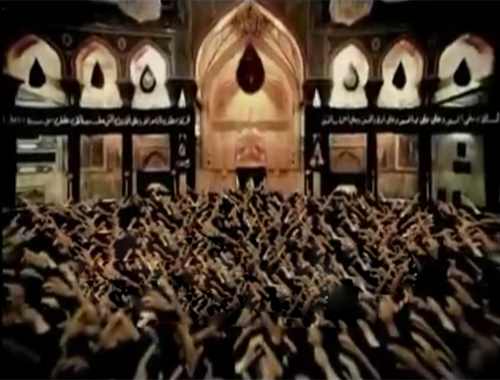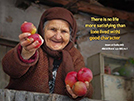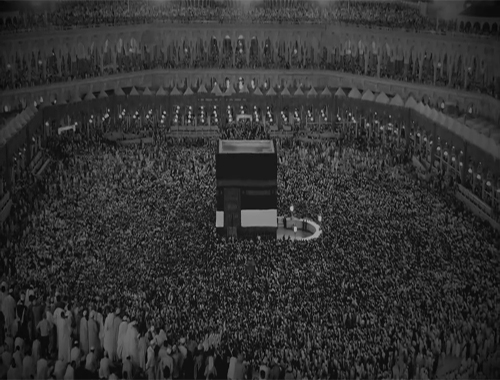Verses 1-11
- Details
- Hits: 2608
Sura Lail
(The Night)
No.92 (Verses 1-11)
بسم الله الرحمن الرحيم
(1)وَاللَّيْلِ إِذَا يَغْشَى
(2)وَالنَّهَارِ إِذَا تَجَلَّى
(3)وَمَا خَلَقَ الذَّكَرَ وَالْأُنثَى
(4)إِنَّ سَعْيَكُمْ لَشَتَّى
(5)فَأَمَّا مَن أَعْطَى وَاتَّقَى
(6)وَصَدَّقَ بِالْحُسْنَى
(7)فَسَنُيَسِّرُهُ لِلْيُسْرَى
(8)وَأَمَّا مَن بَخِلَ وَاسْتَغْنَى
(9)وَكَذَّبَ بِالْحُسْنَى
(10)فَسَنُيَسِّرُهُ لِلْعُسْرَى
(11)وَمَا يُغْنِي عَنْهُ مَالُهُ إِذَا تَرَدَّى
In The Name Of Allah. The Beneficent, The Merciful
1. By the night when it enshrouds,
2. By the day when it brightens up,
3. By Him who created the male and the female,
4. Verily (the ends) you strive for are diverse.
5. Then as for him who gives (in charity) and fears (Allah),
6. And (in all sincerity) testifies to the Best,
7. We will ease him to the state of ease.
8. But he who is a greedy miser thinks himself self-sufficient,
9. And gives lie to the Best,
10. We will ease him to the path of affliction,
11. And his wealth will not avail when he perishes.
The Occasion of the Revelation of Sura Lail:
Commentators have cited an occasion of revelation for the whole Sura on the authority of Ibn-Abbas. Here is what the late Tabarsi has said in Majma'-al-Bayan:
There was a man among the Muslims who had a palm tree, a branch of which was bent towards the house of a poor man who had a large family. Sometimes the owner of the palm tree would collect the fruit and if by chance some dates fell in the poor man's yard and his children picked them up, the owner would come and snatch them away from their hands and even from their mouths.
The poor man complained to the holy Prophet (p.b.u.h.) who, in turn, requested that the man leave until he (p.b.u.h.) could investigate the situation.
Then, it happened that the Prophet (p.b.u.h.) met the owner of the palm tree and asked him if he would give him (the holy Prophet) the tree in question, in return for a palm tree in Paradise. The man declined with the plea that the dates of that tree, among all his numerous trees, were so delicate that he could not give it up.
There was another man, according to some narrations, named Abul-Dahdah, who heard what the holy Prophet (p.b.u.h.) promised the owner. He said, O' Messenger of Allah! Would you promise the same to me if I get the palm tree from the owner and give it to you? The holy Prophet (p.b.u.h.) said, Yes.
So, the man went to the owner of the palm and talked with him and questioned him as to if he knew that the Prophet (p.b.u.h.) had offered a palm tree in Paradise instead of the one he had and he answered that he had many palm trees, but, the taste of the dates of that tree was the most delicious.
Then, the man asked the owner whether he wanted to sell it, and he refused unless he received a sum that he supposed no one would pay. The man asked about the price and the owner answered that it was forty palm trees.
The buyer was astonished and told him that it was an expensive price that he demanded for a bent palm tree--forty palm trees! Then, after a short pause the buyer agreed to give him forty palm trees. The greedy seller asked him to call some people as witnesses for the exchange and the buyer did. After that, he went to the holy Prophet (p.b.u.h.) and presented the palm tree to him.
The Messenger of Allah went to the poor man and told him that the palm tree was in his and his children's possession.
It was there that Sura Lail was descended and stated what it declared about the righteous and the wrongdoers.
* * * *
Commentary:
Piety and the Divine Assistance
At the beginning of this Sura, again. we find three reflective oaths about the 'creation' and the Creator of the world. It says:
By the night when it enshrouds,
The use of the term /yaqsha/ 'enshrouds' is because night, like a creature, covers half of the globe and brings it under her authority, or is for the reason that the light of the day or the rays of the world-illuminating sun 'hides' when night comes forth in any case, it is an evidence to the importance of Night's effective role in men's lives, including the adjustment of the sun's heat, the resting of the living creatures in it, and the adoration of the night by awake, vigilant believers.
* * * *
Then, our attention is attracted to another oath. It says:
By the day when it brightens up,
'Day' begins from the moment that the light of dawn breaks the curtain of the gloom of night and removes the darkness and dominates the expanse of heaven, filling everywhere and everything with its glory and light; the very light that is the secret of the life of all living things.
In the Qur'an the contrast of 'light' and 'darkness' and their effect in Man's life is repeatedly stated and emphasized on, because they are two perpetual great blessings and are, also, two Divine Signs.
* * * *
Then, the last oath of this Sura is mentioned. It says:
By Him who created the male and the female,
The existence of the mystery of the sexes runs through all life in human beings, animals and plants. The process of development that occurs in the life-germ from the very beginning until the time of birth, the characteristics of both sexes due to their functions and actions, and the secrets hidden in the sex phenomena are all Signs of the glorious world of creation through which we may understand the greatness of its Creator.
The term /ma/ 'something, a thing' used, here, for Allah is for the extraordinary greatness of His Entity that has an ambigious state which is beyond the imagination and human concept.
Some have also said that /ma/, here, in Arabic is 'masdariyah'. If so, the sentence means: 'By the creation of male and female'. But, this interpretation seems feeble.
In fact, the first two oaths refer to the celestial Signs while the third oath points to the human signs.
* * * *
The conclusion of the aforementioned oaths is stated in the next verse. It says:
Verily the (ends) you strive for are diverse."
People have different or diverse aims in life for which they strive. One might be talking of the pleasures of this world while another may be mindful of the life in the Hereafter. No one lives aimlessly, but we should be careful of the way in which we use our divine talents and powers in order to understand if it is for good or evil.
The term /shatta/ is the plural form of /shatit/ and is derived from /shatt/ which means 'separate, divided'.
Then, the Qur'an, dividing people into two groups; addressing the first says:
* * * *
Then as for him who gives (in charity) and frars (Allah),
* * * *
And (in all sincerity) testifies to the Best,
* * * *
We will ease him to the state of ease.
The purpose of using the term /a'ta/ is for the meaning of charity in the way of Allah and helping the needy.
Then, immediately after that, it emphasizes on 'piety' which may refer to the necessity of pure intention in practicing the action lawfully and with permitted wealth, without any reproach or harm or hurt, because all of the meanings are gathered in the sense of 'piety'.
Some have said that /a'ta/ refers to financial actions done for Allah and /atqa/ refers to other religious actions of worship. But, the first commentary is better, because it adapts both to the appearance of the verse, and to the occasion of revelation that was mentioned before.
The idea of 'testifying to the Best' indicates 'the faith in the Divine blessed rewards', as Abul-Dahdah, the believing man, mentioned in the story on the occasion of revelation of the Sura, who with faith in the Divine blessed rewards, spent his wealth. This meaning is also mentioned in Sura Nisa, No. 4, verse. 95: ...unto all (in Faith) hath Allah promised good....
Some have said the phrase means 'the best religion', i.e. 'The faith in Islam' which is the best religion.
Some have rendered the words thus: I testify that there is no god besides Allah, and I testify that Mohammad is the apostle of Allah. But, regarding all conditions, the first commentary seems more fitting.
The sentence: We will ease him to the state of ease may refer to the success, given by Allah, and making the path of obedience for such persons easy; or paving the road to paradise for them and the act of receiving and greeting them by angels; or it may include all of them.
No doubt, those who give charity and alms, piously, and believe in the Divine rewards, their difficulties will be changed into easy affairs for them. and will have enjoined a special calmness both in this world and the next.
In the beginning the payment of the alms-tax and giving charity may seem difficult for us, but with continued and frequent practice it will become easy, so that we will gain enjoyment from it.
There are many generous people who are happy to have guests present at their meals but, if they do not receive anyone on a particular day. they wiIl be rather sad. Therefore, for them to receive guests is a kind of. ease in their lives.
We should not neglect that, in principle, belief in the Resurrection and in Divine, immense rewards changes Man's tolerance of different hardships and makes them easy for him. This kind of believing man will spend, eagerly, not only his wealth, but. will also give up his dear, sweet life for the love of martyrdom on the path of Allah.
The term /yusra/ is derived from /yusr/ that basically means 'to saddle a horse and make it ready to ride on', and the term has been used for any easy deed.
In the next verse attention is paid to the contrary group and says:
But he who is a greedy miser and thinks himself self-sufficient,
* * * *
And gives the lie to the Best,
* * * *
We will ease him to the path of affliction.
Here, the term /bukhl/ 'miser' is mentioned opposite to /a'ta/ 'being generous' which we find in the first group; and /istaqna/ 'demands self-sufficiency' is either an excuse for the conduct of avarice and a means of heaping up wealth, or it refers to an imagination of being self-sufficient of the divine rewards. This characteristic is just opposite to that of the former group who always seek Allah's favour. Or, since the latter group think that they do not need to obey their Lord, then they always commit sin.
Among these three commentaries the first one seems more appropriate, though all of them may be combined.
The purpose of the phrase gives the lie to the Best is for signifying disbelief in the rewards of the Next World or rejecting the religion and the good ways of the prophets.
The sentence: We will ease him to the path of affiction is a state opposite to the case in the sentence: We will ease him to the state of ease where Allah brings forth his favor and the righteous succeed on a smooth path of obedience and charity which makes them free from the difficulties of life. But, the members of the other group are in absence of success, and travelling the path is difficult for them. They will be involved in hardships in this world and the next.
In general, the fulfillment of good deeds and especially payment of charity and the alms-tax in the way of Allah is difficult for the disbelieving , greedy misers, while it is easy, exciting and pleasant for the righteous.
* * * *
At the end of this part of the Sura, the blind-hearted, greedy misers are warned:
And his wealth will not avail him when he perishes.
He can neither take anything of his worldly property with him, nor could it prevent him from the fire of Hell.
The term /ma/, at the beginning of the verse, may be a negative sign (as it was mentioned above), or for questioning in the negative. If so, the sentence means: ' what benefit can he take from his wealth when he falls in the grave or Hell?"
The term /taradda/ is based on /rida 'at/ and /radaya/ which means 'to perish, to fall' and since falling from a high place usually causes one to perish, it is also used in the sense of 'perdition'. In the current verse it may mean 'to fall into the grave, or Hell, or perdition as a punishment.'
Thus, the Qur'an, in these verses, speaks about two groups of people: The first is the righteous who are pious, generous believers; and the second is the group of unbelievers who are impious and miserly. The examples of both groups are clearly pointed out in the description of the occasion of revelation.











